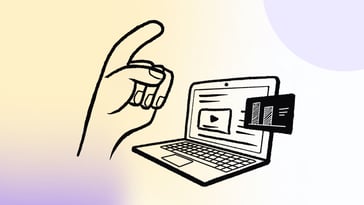In IT Asset Management (ITAM), choosing the most suitable solution is paramount for organizations striving to optimize their operations. You may be torn between two ITAM software alternatives: Lansweeper vs. Snow License Manager.
Both platforms offer unique features and functionalities that cater to different organizational needs. In this blog post, we’ll comprehensively analyze Lansweeper vs. Snow License Manager, examining their key attributes, strengths, and limitations. However, these two options may not fully meet the requirements of every organization. That's why we’ll introduce you to a third alternative you may not have considered: InvGate Asset Management.

Table of contents
- TL;DR
- What is Lansweeper?
- What is Snow License Manager?
- Considering InvGate Asset Management as an ITAM solution alternative
TL;DR
- Lansweeper provides seamless SaaS deployment and efficient software visibility, making asset tracking effortless. However, it does encounter hurdles when it comes to scaling for large enterprises and may experience delays in scanning updates.
- Snow License Manager efficiently handles licenses, mitigating risk by monitoring licensing requirements and hardware/software demands. Nevertheless, configuring the system can present challenges.
- InvGate Asset Management offers comprehensive IT asset and inventory management with seamless data integration. It improves operational efficiency with features like CMDB Map Builder, automation capabilities, and native service desk integration.
This guide has everything you need to now, but if you don't have enough time to go over every single detail, here's (another) TL;DR: InvGate Asset Management can do everything we listed here, and you can test it right away for free for 30 days.
Most looked-at features by buyers
When assessing IT Asset Management solutions, buyers often consider various essential features to find the most suitable option for their specific requirements and business needs.
Here are some key factors buyers consider when choosing an ITAM solution tailored to their organization.
- Proactive cost management and financial optimization - The solution should incorporate financial data, contract lifecycle management, licenses, and other relevant information to understand operational costs comprehensively.
- Unified IT Asset and Inventory Management - By having a unified IT asset inventory feature, users can efficiently track and oversee their entire inventory of IT assets from a single platform. The solution should enable automated asset discovery, capturing vital information like hardware specifications, software versions, and ownership details.
- Comprehensive insights into IT infrastructure - The platform should offer complete visibility into IT asset status, performance, and usage, empowering users to make informed decisions and optimize their infrastructure. Additionally, it should provide reporting and analytics capabilities.
- Automated management and proactive notifications - The solution should allow the creation of automated workflows for regular tasks such as software updates, patch deployments, and system maintenance. Users can ensure smooth operations and promptly respond to critical events by automating tasks and receiving proactive notifications.
- CMDB Map Builder - This functionality lets users define and document relationships between various components, including hardware devices, software applications, network connections, and dependencies. By visualizing these relationships, organizations can better understand the impact of changes, assess risks, and plan for efficient Incident Management and Change Management.
- Optimization of software management - This feature enables users to monitor software installations, ensure effective Software License Management, and identify instances of over or underutilization.
- Enhanced cybersecurity compliance - Buyers seek a tool that continuously monitors assets and their security posture, aiding in the proactive detection and mitigation of security risks.
- Remote management with integrated tools - Integration with popular remote desktop tools allows IT teams to remotely diagnose issues, apply patches, install software, or perform system updates remotely, eliminating the need for physical presence.
- Flexible deployment options - Users desire a platform that offers the flexibility to choose between different deployment models, such as cloud-based, on-premise, or hybrid.
- Service desk integration - Integration with help desk software enables a seamless flow of information between Asset Management and IT Service Management processes. This integration improves communication, streamlines workflows, and enhances overall service delivery.
What is Lansweeper?
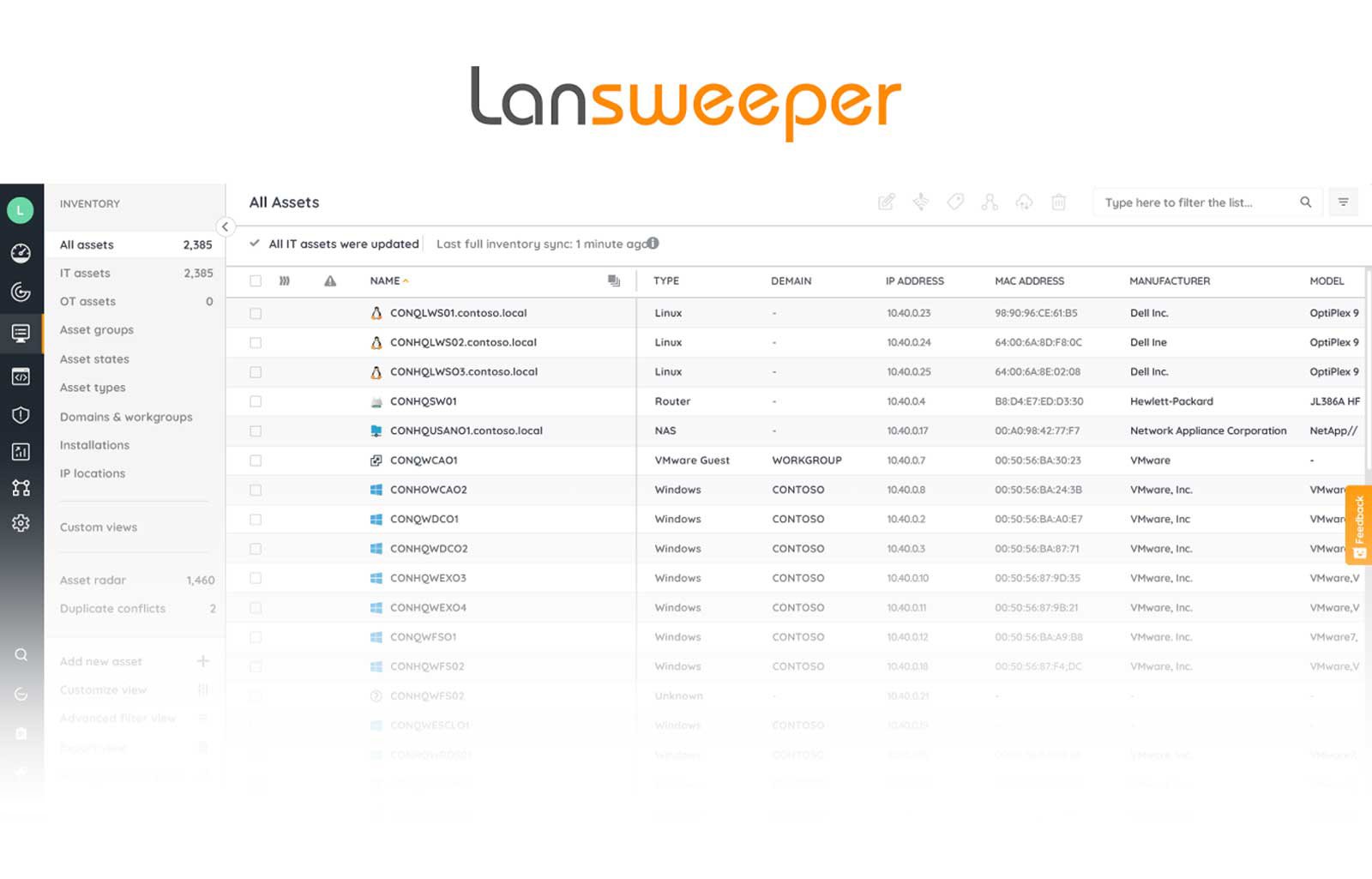
Lansweeper is an IT Asset Management solution that enables organizations to effectively manage their assets and gain valuable insights into their IT infrastructure. It offers the flexibility of being available both as a cloud service and as an on-premise installation.
Equipped with a comprehensive suite of features and functionalities, Lansweeper provides a robust set of tools for device scanning, Inventory Management, report generation, software license control, asset lifecycle management, and security vulnerability handling.
Since its inception in 2004, Lansweeper has emerged as a trusted and reliable solution for organizations seeking to optimize and take control of their IT infrastructure.
What users like from Lansweeper
Lansweeper has gained recognition and positive feedback from customers, as acknowledged by reputable sources such as Gartner. Here are some of the highlighted advantages.
- User-friendly interface - The software has an intuitive interface with pre-configured security reports, making it easy to navigate and utilize.
- Thorough asset monitoring - The platform maintains detailed records of all devices entering the network, providing a comprehensive overview of the IT infrastructure.
- Simplified implementation - Lansweeper, being a Software-as-a-Service (SaaS) solution, eliminates the need for individual software installations, making the deployment process hassle-free.
- Precise scanning - Lansweeper's scanning capabilities are highly accurate, ensuring comprehensive and reliable detection of devices and software on the network.
- Enhanced software visibility - The software ensures complete visibility of deployed software within the organization, facilitating effective Software Management and optimizing license usage.
- Remote server management - Lansweeper enables administrators to manage servers remotely, simplifying tasks and allowing centralized monitoring of server status.
- Customizable integrated reporting - The tool offers built-in reporting capabilities that can be tailored to specific requirements, enabling organizations to generate comprehensive reports and gain valuable insights into their IT assets.
- Asset placement visualization - Users can create maps to visualize the placement of assets, particularly useful for managing assets in complex buildings or large facilities.
- Efficient resource utilization - Lansweeper has a lightweight and efficient resource usage, minimizing the impact on system performance and ensuring smooth operation.
- Agentless operation - The software operates without the need for agents to be installed on devices, simplifying management processes and reducing potential conflicts.
- Cost-effective solution - Lansweeper offers competitive pricing, delivering robust IT Asset Management features while providing cost savings for organizations.
What users don’t like from Lansweeper
While Lansweeper has many strengths and positive attributes, it is not immune to customer concerns and criticisms. Reviews from trusted sources such as Gartner have highlighted some of the most common issues expressed by users. Here are some of them.
- Complex custom querying - Users often find it challenging to create custom queries in Lansweeper, particularly when dealing with intricate query structures. The process may entail a steep learning curve and demand technical expertise.
- Limited Internet of Things (IoT) firmware information - Lansweeper does not offer comprehensive firmware details for IoT devices, making it difficult for users to retrieve and monitor firmware information through the platform.
- Scalability limitations - While Lansweeper functions well for small organizations, its effectiveness may be limited for large enterprise companies that require scalable solutions to manage complex IT infrastructures.
- Absence of historical software views - Lansweeper lacks support for historical views of software in its database. Consequently, users are unable to access past software data, restricting their ability to track software changes over time.
- Automatic asset deletion from the database - Assets deleted from the system in Lansweeper are automatically removed from the database. Some users consider this problematic and prefer the option to retain deleted assets for reference or historical purposes.
- Busy Graphical User Interface (GUI) - Some users perceive the Lansweeper GUI as overwhelming due to the abundance of visible options. Simplifying the interface by organizing specific options into collapsible menus could result in a cleaner and more streamlined user experience.
- Delayed scanning updates - Despite frequent scanning, the platform may not always provide real-time information, leading to outdated data. This necessitates users to invest additional manual effort to ensure data accuracy.
- Limited asset change tracking - Users have expressed the need for enhanced asset change tracking and history in Lansweeper. The current system offers limited tracking of asset-related items, such as monitor connections or IP usage, displaying only the latest scanned information.
- Challenges with the licensing system - Lansweeper's new licensing system may require organizations to pay for more assets than they actually require, imposing a minimum starting requirement of 2000 assets. This aspect may be seen as a drawback, particularly for smaller-sized organizations.
- Complexity of Patch Management - Lansweeper's Patch Management feature, known as deployment packages, can present difficulties for some users in terms of effective patch deployment and software update management.
- Outdated dashboards - Some users find the dashboards in Lansweeper outdated. Despite ongoing efforts to modernize them into a more cloud-based console, users desire a contemporary and visually appealing dashboard experience.
- Complexity and accuracy issues with the reporting module - Lansweeper's reporting module may require users to possess a basic understanding of relational databases to utilize its capabilities effectively. Users often feel that additional training or database knowledge is necessary for optimal use. Moreover, occasional inaccuracies in reports mandate users to verify and cross-check the information provided.
- Limited regional support - In certain regions like Argentina, the availability of Lansweeper partners may be restricted. This can affect the accessibility of local support or services, potentially inconveniencing users in those regions.
What’s Lansweeper’s argument over Snow License Manager?
When comparing Lansweeper and Snow License Manager as ITAM solutions, it's essential to consider their strengths and weaknesses. Here's an analysis of Lansweeper's argument over Snow License Manager based on the pros and cons of both solutions.
- User-friendly interface - Lansweeper offers an intuitive interface with pre-configured security reports, making it easy for users to navigate and utilize the software. In contrast, Snow License Manager may face challenges with its configuration process, potentially leading to a less optimal user experience.
- Simplified implementation - Lansweeper, a SaaS solution, eliminates the need for individual software installations, making the deployment process hassle-free. On the other hand, Snow License Manager may require more effort and expertise during the integration and implementation process.
- Cost-effective solution - Lansweeper offers competitive pricing while delivering robust IT Asset Management features, providing cost savings for organizations. In contrast, Snow License Manager is mentioned as having high costs, which can be a drawback, particularly in terms of initial acquisition and ongoing maintenance.
What is Snow License Manager?
Snow License Manager is a Software Asset Management (SAM) tool created by Snow Software. It assists organizations in managing their software licenses, optimizing software usage, and ensuring adherence to licensing agreements. It offers various features and functionalities to help organizations understand their software assets, enabling them to make informed decisions about software procurement, usage, and cost optimization.
Snow Software is an international vendor that specializes in providing technology intelligence solutions for Software Asset Management, IT Service Management, and Enterprise Mobility Management. Headquartered in Stockholm, Sweden, Snow Software has a strong global presence with regional offices across the United States, Europe, and Asia. Since its establishment in 1997, the company has been a leader in delivering a comprehensive range of products and services to help organizations optimize their technology investments and maximize value.
Alongside Snow License Manager, the company's product portfolio includes Snow Device Manager, Snow Inventory, and Snow Automation Platform.
What users like from Snow License Manager
Snow License Manager has received recognition and positive feedback from customers, as validated by reputable sources like Gartner. Here are some of the notable benefits.
- User interface - Snow License Manager has an intuitive user interface with a design that promotes ease of use. It provides a good display in every process, making it straightforward for users to navigate and interact with it efficiently.
- Support - Users have expressed that the communication with the support team is excellent, ensuring they can address their concerns effectively. Additionally, there is the opportunity to join the beta program, allowing users to access new features and provide feedback. Moreover, having a dedicated customer success manager helps in achieving successful outcomes.
- Software Recognition Service (SRS) - The tool offers a comprehensive and thorough SRS. It is regularly updated to ensure accurate identification of software assets. The agents used for the service are stable, providing reliable results.
- Reporting - Snow License Manager offers a range of useful standard reports that provide insights into software usage and hardware information collected by agents. Users can easily create reports tailored to their specific needs.
- Cost - The platform provides valuable insights into installations and compliances, helping organizations save costs in audits by ensuring license compliance.
- Performance - Snow License Manager excels in consolidating information and adopts an audit-ready approach, allowing organizations to maintain a detailed inventory of their software assets.
- Integration - The software offers good integration capabilities with SAP environments, streamlining workflows and enhancing compatibility. The lightweight agents used for integration ensure efficient operation.
- Licensing - The tool simplifies the tracking and viewing of software licenses and compliance issues. It provides straightforward tools to manage licenses effectively, helping organizations maintain compliance with licensing agreements.
- Maintenance - The platform receives constant updates, ensuring it remains up-to-date with the latest features and security enhancements. It is considered a mature product with a solid track record.
What users don’t like from Snow License Manager
Although Snow License Manager possesses several strengths and positive qualities, it is not impervious to customer concerns and criticisms. Evaluations from reliable sources like Gartner have shed light on some of the prevalent issues raised by users.
- User interface - The configuration process of Snow License Manager can be challenging and not always straightforward. Users may encounter difficulties when customizing the interface to suit their specific requirements, which can lead to a less optimal user experience.
- Support - Users have reported that the response time from the support team can be slow, causing delays in issue resolution. Additionally, there have been instances where the support team lacks sufficient problem-solving skills, resulting in prolonged troubleshooting processes. Moreover, users have expressed dissatisfaction with inconsistent support experiences, as the quality and effectiveness of support can vary.
- SRS issues - Snow License Manager may face issues with software identification, where certain software assets might not be accurately recognized or identified by the system. This can lead to incomplete or inaccurate reporting of software inventory. Additionally, there might be challenges related to cross-platform rights, causing limitations in the recognition and management of software assets across different platforms or operating systems.
- Reporting - While the platform offers a range of useful standard reports, some users have suggested that the reporting functionality could be further developed. Users may find limitations in generating specific or customized reports, and the process of creating complex or tailored reports can be time-consuming and require additional effort.
- Cost - One of the drawbacks of the tool is its high cost. Organizations may find the platform to be expensive, particularly in terms of initial acquisition and ongoing maintenance costs. Additionally, there might be extra costs associated with technical support services, which can further contribute to the overall cost burden.
- Performance - Snow License Manager's performance can be affected by large data volumes. When organizations have extensive software inventory or complex IT environments, the system may experience performance issues such as slower response times or delays in generating reports. Additionally, users have reported encountering bugs or limitations within the software, which can restrict certain functionalities and hinder optimal software utilization.
- Integration - Some users have found that the integration and implementation process of the software is not straightforward. Organizations may encounter challenges when integrating the software with existing systems or when configuring the necessary agents for seamless operation. The agent configuration process might not be user-friendly, requiring additional effort and expertise to ensure successful integration.
- Licensing - Users have expressed concerns over the lack of notifications when a sync fails during the licensing process. This means that if there are any synchronization issues between Snow License Manager and the software license databases, users may not receive immediate alerts or notifications, potentially leading to compliance issues. Additionally, providing a comprehensive software license position can be time-consuming, requiring manual effort to gather and consolidate accurate license information.
- Maintenance - The tool incurs high maintenance costs, which organizations need to consider when budgeting for the software. Furthermore, some users have reported that product upgrades can cause issues or disruptions in the system's functionality. Organizations may need to allocate additional resources and plan for potential disruptions during the upgrade process to minimize any adverse effects on their operations.
What’s Snow License Manager’s argument over Lansweeper?
When comparing Snow License Manager with Lansweeper as IT Asset Management solutions, it's essential to consider the strengths and weaknesses of each software.
Here's an analysis of Snow License Manager's argument over Lansweeper based on the pros and cons of both solutions.
- Support - Snow License Manager receives positive feedback regarding its support team. Users have expressed that the communication with the support team is excellent, ensuring prompt resolution of their concerns. The platform also offers the opportunity to join beta programs, allowing users to access new features and provide feedback.
- Software Recognition Service - Snow License Manager offers a comprehensive and thorough SRS. The platform is regularly updated to ensure accurate identification of software assets. The stable agents used for the service provide reliable results.
- Integration - Snow License Manager offers good integration capabilities with SAP environments, streamlining workflows and enhancing compatibility. The lightweight agents used for integration ensure efficient operation.
Considering InvGate Asset Management as an ITAM solution alternative
InvGate Asset Management is a robust ITAM solution that offers a variety of features and functionalities to streamline Asset Management processes. Here are the key features it provides.
Proactive operational cost management
InvGate Asset Management allows you to incorporate financial data, contracts, licenses, and other essential information directly into the system. This integration provides a complete understanding of your operational costs, enabling proactive and informed financial decision-making. By optimizing budget allocation, you can maximize the value derived from your IT investments.
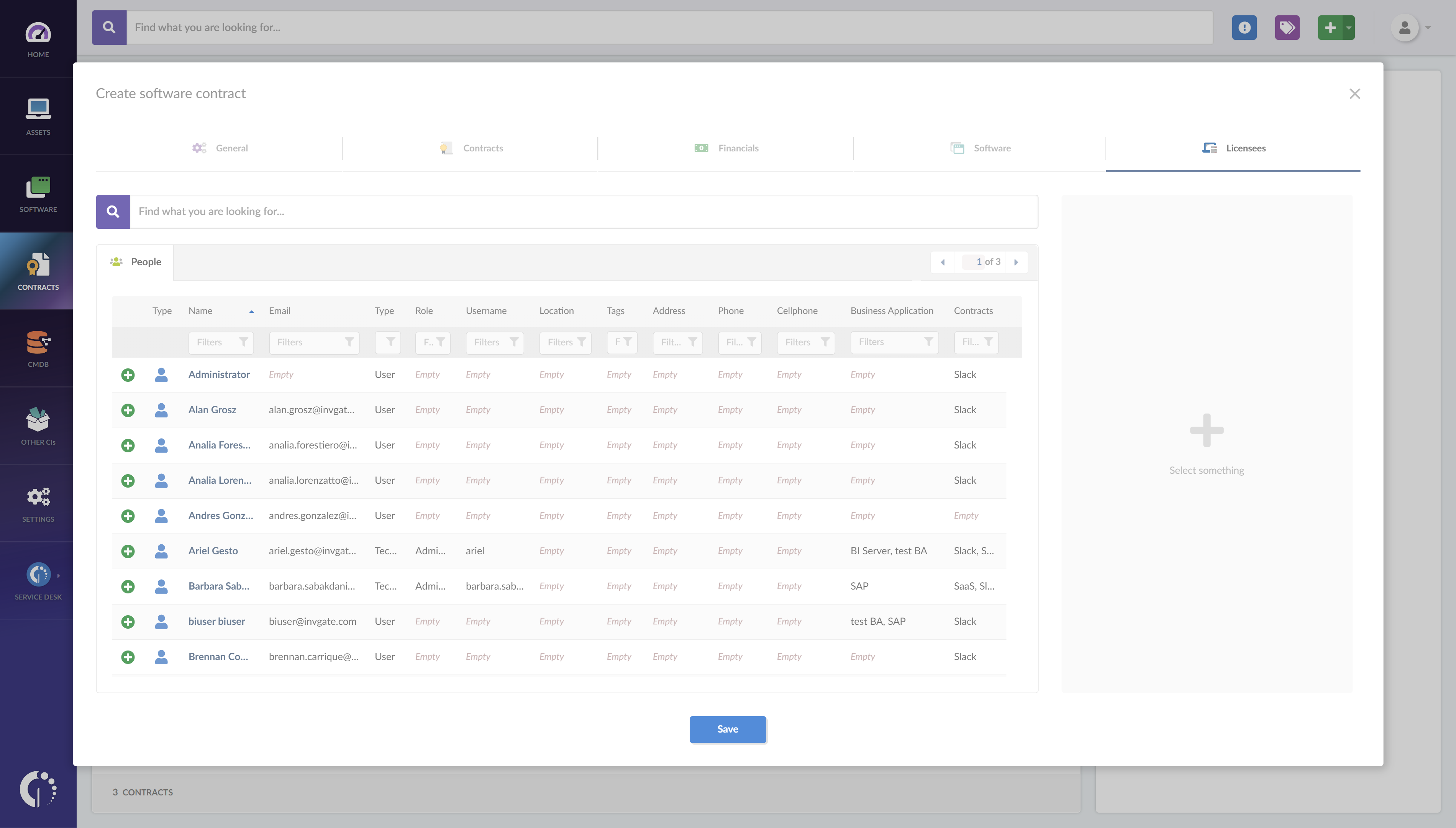
Enhanced cybersecurity compliance with asset monitoring
InvGate Asset Management's asset monitoring capabilities enable establishing and enforcing device health rules, facilitating proactive cybersecurity compliance. By quickly identifying instances of non-compliance, you can take immediate action to ensure adherence to cybersecurity policies and safeguard your IT infrastructure.
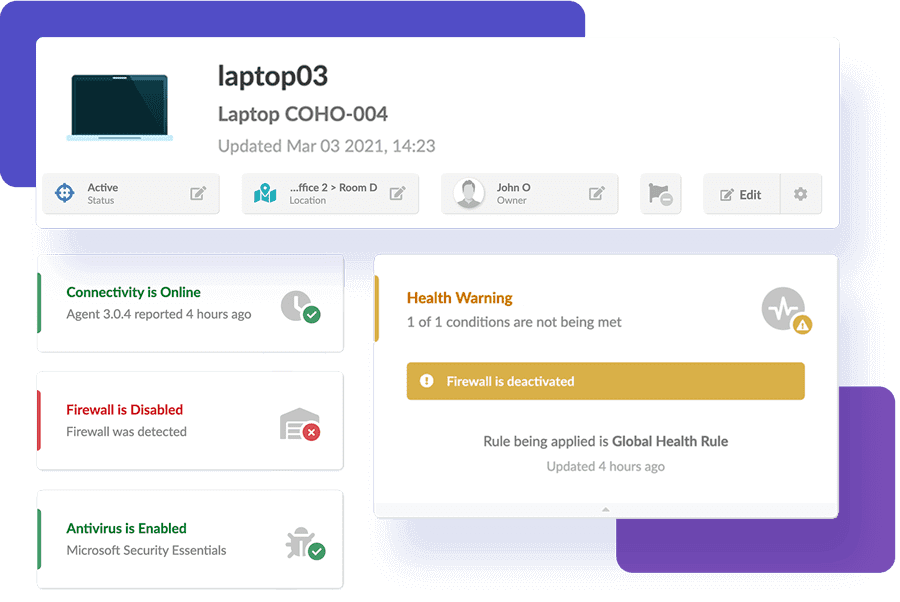
Improved IT Asset and Inventory Management
InvGate Asset Management seamlessly integrates data from multiple sources, including popular operating systems, cloud service providers like AWS, Google, and Azure, and Mobile Device Managers (MDMs) like JAMF and Google Endpoint Manager. This integration consolidates information, enabling efficient management of IT and non-IT assets, locations, and people, saving time and providing a comprehensive view of your infrastructure.

Streamlined operations with CMDB Map Builder
The CMDB map builder tool in InvGate Asset Management offers a clear and comprehensive overview of your IT ecosystem. By visualizing the relationships between different components, you can identify potential impacts on operational continuity and take proactive measures to mitigate risks. This visibility helps reduce service times, improve operational efficiency, and ensure smoother IT operations.
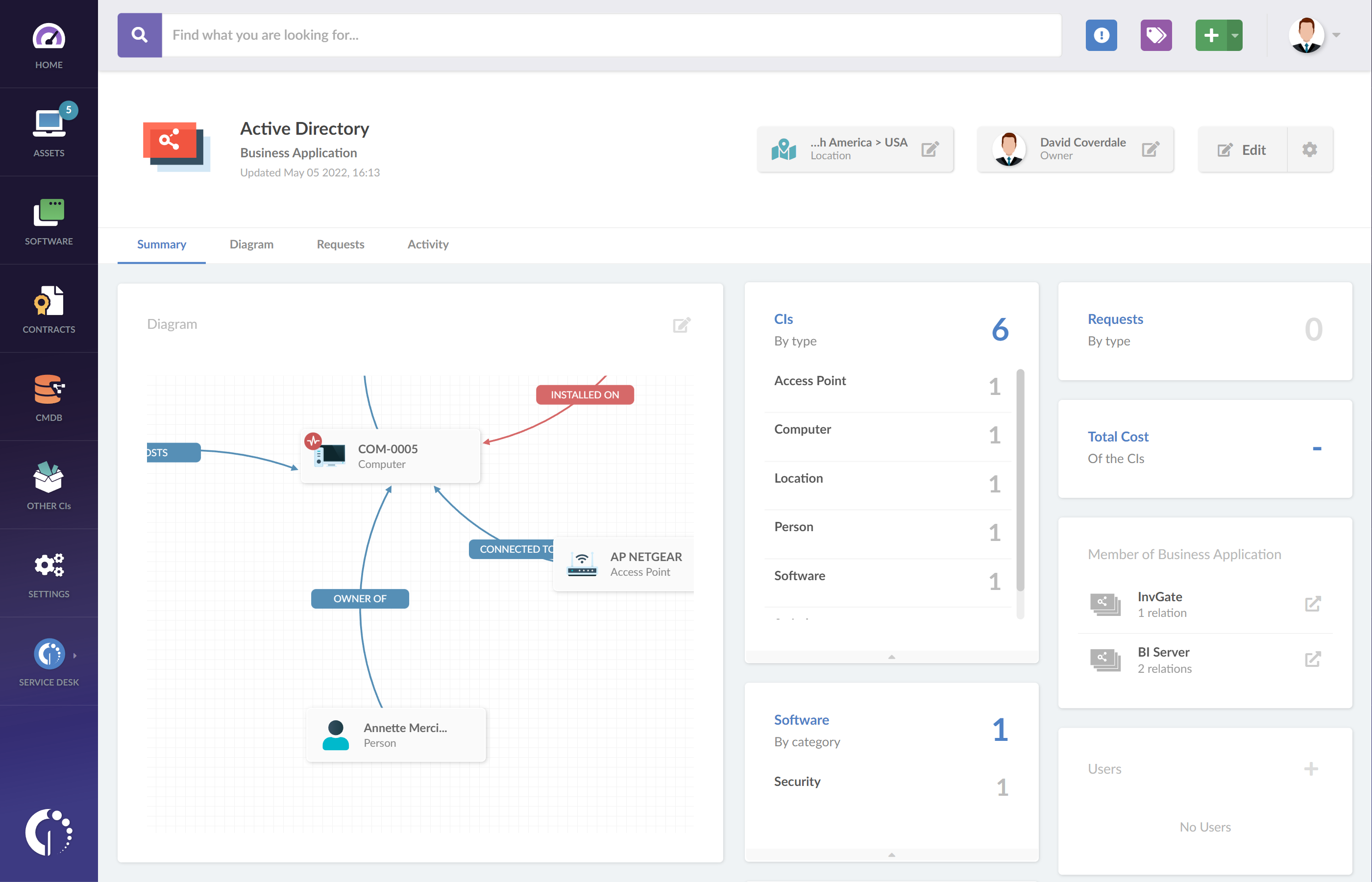
Efficient management through automation and alerts
InvGate Asset Management allows you to automate processes and set up alerts, ensuring proactive IT Management. By creating automated alerts, you can monitor contract expirations and promptly notify relevant parties, reducing manual effort and minimizing the risk of oversight. This automation streamlines operations and allows you to focus on critical tasks, enhancing overall efficiency.
Detailed insights into IT infrastructure
With its robust features, InvGate Asset Management provides detailed and actionable information about your IT assets, including their status and usage. These comprehensive insights allow you to effectively manage and optimize your infrastructure, improving operational efficiency.
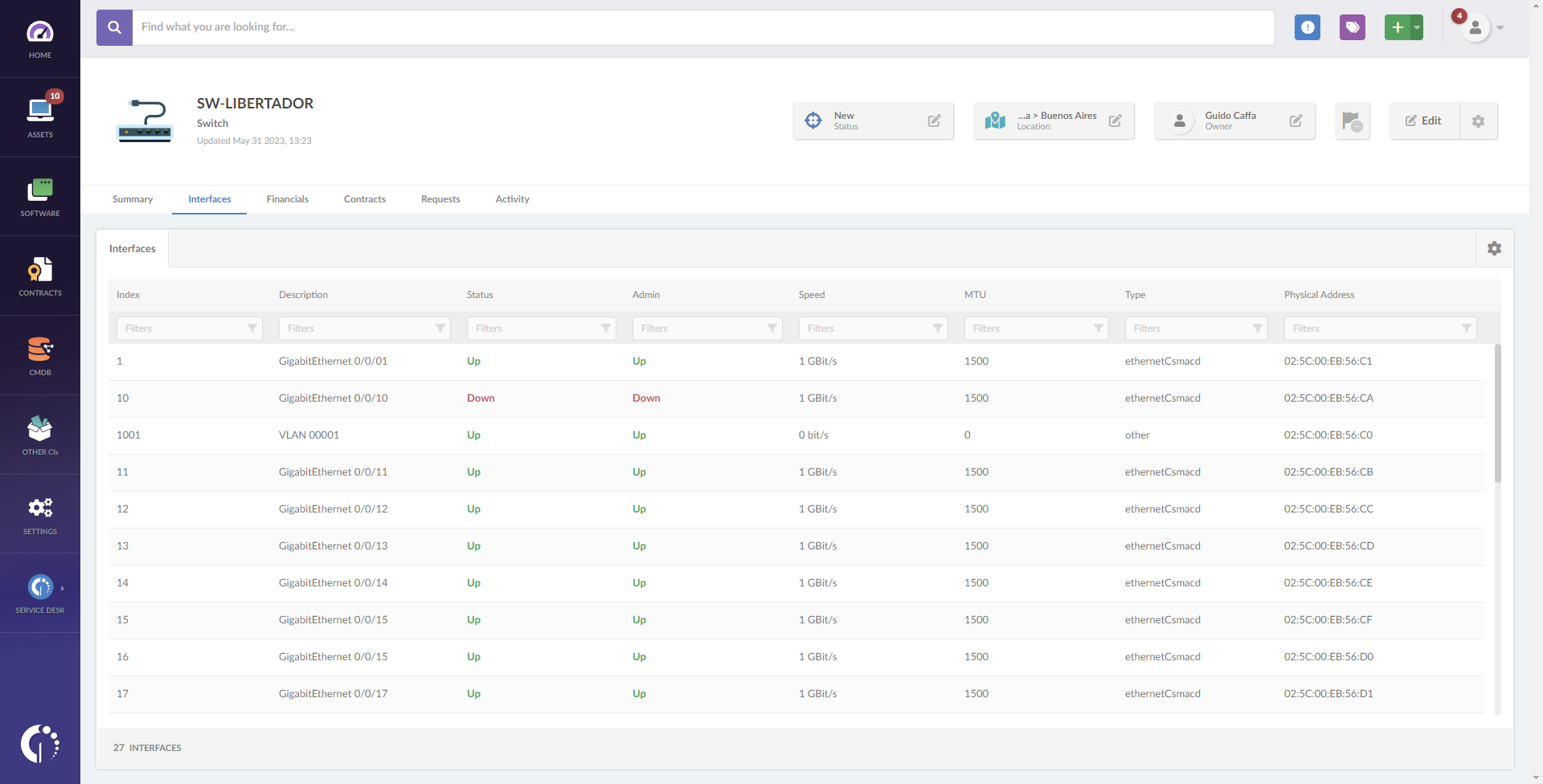
Optimization of software efficiency and cost reduction
InvGate Asset Management empowers you to identify and measure the usage of paid software, facilitating efficient Software Management. By gaining visibility into software utilization, you can reallocate underutilized licenses, reduce unnecessary costs, and maximize returns on your IT investments. This optimization of software efficiency helps you make the most of your software resources.

Flexible deployment options
InvGate Asset Management recognizes that each organization has unique requirements and industry regulations. Therefore, it offers flexible deployment options, allowing you to choose between a cloud-based or on-premise solution. This flexibility ensures that you can implement InvGate Asset Management in a manner that aligns with your specific needs and compliance standards.
Effortless remote management with native integration
InvGate Asset Management natively integrates with popular remote desktop tools such as Windows Remote Desktop, TeamViewer, AnyDesk, and VNC. This integration enhances remote management capabilities, providing direct access to devices for troubleshooting and maintenance. With seamless remote access, you can efficiently address IT issues, perform necessary maintenance tasks, and ensure uninterrupted operations.

A holistic view of IT operations through native service desk integration
InvGate Asset Management seamlessly integrates with InvGate Service Management, providing a native integration that links tickets with devices and people. This integration offers a 360° view of your IT operations, enabling more efficient management. Connecting service tickets to relevant assets and personnel streamlines workflows, enhances communication, and improves issue resolution.

Next steps
Choosing the right IT Asset Management solution is crucial for optimizing your organization's IT service delivery and ensuring long-term success. Investing enough time and effort into thoroughly evaluating your options is essential to ensure a seamless fit with your needs. It's worth comparing solutions like Lansweeper vs. Snow License Manager alongside InvGate Asset Management when considering alternatives.
Explore our live demo and experience firsthand how InvGate Asset Management can revolutionize your business operations. Book a meeting with our experts if you have any further questions!















